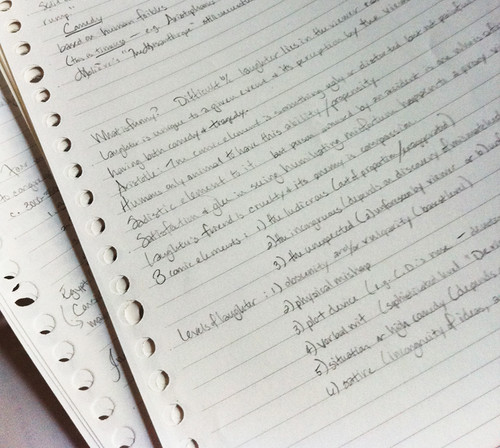
A long time ago, I took a class at San Diego Mesa College called "A Literary Approach to Film," taught by Andrew Makarushka. He was a really entertaining teacher. I remember him reminding me of George Carlin, and I remember him telling us he used to have a radio show (with Gabriel Wisdom, if you're from San Diego or interested in finance). We watched and discussed a lot of great films. And he gave me passes to see Joe Versus the Volcano. And I never forgot his name nor how to spell it.
That is not the purpose of this post.
Earlier today, I followed a link from a tweet by Paul Sabourin of @paulandstorm and read Robert Mankoff's New Yorker article about the #kanyenewyorkertweets meme, of which Paul Sabourin is the originator. Wow. Complicated sentence.
Anyway. Every now and then, I'll be talking to someone who shares my interest in and -- gross and unironic as it sounds to say -- passion for comedy, and I'll mention this class I took and one session when we discussed comedy. I'll cite the discussion of the levels of laughter, but I'll usually forget all but the first and the last. I'll mention that we watched The Prime of Miss Jean Brodie and Prizzi's Honor and Modern Romance, and then I'm off to Tangent Town.
Fortunately, I took notes in my tiny handwriting in my somewhat tiny Japanese looseleaf notebook, which you can see above. And this afternoon, I took the notebook out of a filing cabinet, and typed the notes in a Tumblr, and here they are for you and everyone, so we need never speak again.
Comedy
In 1896, the Lumière brothers made a film of a man watering a lawn. In 1911, Mack Sennett wandered onto the set of a D.W. Griffith picture and ended up studying under the tutelage of Griffith himself, the inventor of film language. Sennett then decided to use the techniques he learned to create a world that was zany and skewed instead of realistic. That was the birth of the Keystone Cops and a world in which all social problems could be solved with "a kick in the rump."
Comedy vs. Humor
Comedy is based on human foibles. Humor is based on content and is therefore timely, e.g., Mort Sahl's Kennedy jokes. Comedy, by comparison, is timeless, e.g., Aristophanes' The Hypocrite. Molière's comedy The Misanthrope is still successful and funny. Whereas Lewis Carroll's Alice in Wonderland's satire is lost, but the comedy remains. Humor changes quickly with the times and can become dated (political cartoons).
What is funny?
This is a difficult problem because laughter resides in the viewer rather than in the event. Laughter is unique to a given event, and its perception in the moment by the viewer. Laughter is evoked by situations having both comedy and tragedy. Aristotle said that the comic element is something ugly or distorted but not painful. Humans are the only animal to have this ability/propensity (i.e., laughter). There is a sadistic element to it, but a person amused by an accident is one who is afraid of it. He experiences satisfaction and glee in seeing humiliating misfortune happen to a proxy victim. Laughter's friend is cruelty, and its enemy is compassion.
The 3 Comic Elements
1. the ludicrous (out of proportion/exaggerated)
2. the incongruous (depends on discovery of mismatched characters in a normal setting or vice versa)
3. the unexpected ([a] unforeseen by viewer or [b] unforeseen by proxy victim)
The 6 Levels of Laughter
1. obscenity and/or vulgarity (basest level)
2. physical mishap
3. plot device (e.g., Cyrano de Bergerac's nose -- denotes expectation of humor)
4. verbal wit (sophisticated level -- "De rien. Il n'y a pas de quoi.")
5. situation or high comedy (depends on incongruity of characters)
6. satire (incongruity of ideas, audacious, most intellectually demanding, most risky)
So those are my notes. You already saw a picture of them. Can you believe my tiny handwriting? It's pretty unbelievable.
I don't know if this directly addresses the Kanye/New Yorker discussion, but inspiration is its own excuse. And that even sounds a little like an iterative expansion of Paul Sabourin's thesis: The context is the joke. Which maybe belongs in these notes somewhere.